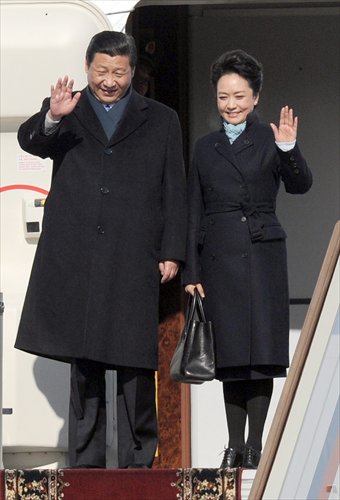New chapter in foreign relations

Chinese President Xi Jinping and his wife, Peng Liyuan, touch down at Vnukovo International Airport outside Moscow on March 22, beginning his first foreign visit as president. Photo: AFP
China's diplomacy has turned a brand-new page in 2013 after its new leadership stepped into the global arena, vowing to better integrate with the world while keeping in mind "the Chinese dream."
Chinese leaders have left their footprints in dozens of countries throughout Asia, Africa, Europe, Latin America and North America and welcomed the visits of more than 50 state leaders to Beijing.
Developing relations with major world powers, such as the US and Russia, is still the focus of Chinese diplomacy, said Li Xiangyang, director of the National Institute of International Strategy at the Chinese Academy of Social Sciences, adding that the summit between Chinese President Xi Jinping and US President Barack Obama in California in June set a good precedent for the two countries in building an informal model that allowed for a new exchange of views.
Li added that the Chinese government has taken a more central role this year. For example, "China has played an important role in solving Syria's chemical weapon crisis and Iran's nuclear crisis, indicating the nation is becoming a more responsible power."
New models
Establishing a new model of relations between great powers is another theme of this year, which saw the first Sino-US presidential meeting, Xi's first visit to Russia, the 16th China-EU leaders' meeting and Chinese Premier Li Keqiang's meeting with counterparts from 16 Central and Eastern European countries.
The Chinese leadership has made significant adjustment to its diplomatic concepts in 2013, Teng Jianqun, a research fellow on American studies with the China Institute of International Studies, told the Global Times.
"Seeking a deliberate balance between an increasingly confident China and a not so confident US, the US side is attaching more importance to bilateral relations in Obama's second term," he said.
However, China-US ties also have undergone ups and downs this year. Just days after China declared an Air Defense Identification Zone (ADIZ) over the East China Sea in November, the US dispatched two B-52 strategic bombers to the zone and has reiterated that it does not recognize the ADIZ.
"The most difficult part of building a new type of relations between China and the US is to build mutual strategic trust between the two," Teng said, likening the two countries to a newly wed couple who are still in the period of running-in.
Teng added that Chinese leaders are seeking more balanced diplomatic ties with other countries. "The leadership is becoming more proactive, which can be seen from Xi's decision to visit countries like Trinidad and Tobago instead of traditionally friendly countries like Venezuela."
Peripheral diplomacy
Beijing has shifted its strategic focus from maintaining good relations with large economies to neighboring countries, Su Hao, director of the Asia-Pacific Research Center at the China Foreign Affairs University told the Global Times.
Instead of the US and European countries, China's new leadership picked neighboring countries as the destination for their first visit, Su said.
Xi paid his maiden visit to Russia in March, one week after he took office, and half of the 14 foreign trips he has made this year have been to China's neighbors. Li visited India and Pakistan before going to Europe, and seven out of nine countries Li toured this year border China.
A series of major strategies have been proposed by Chinese leaders in developing China's good neighbor relations, Su said.
Speaking at a diplomatic work conference in October, Xi said China's neighborhood diplomacy should stick to the principles of amity, sincerity, mutual benefit and inclusiveness.
Xi proposed China and Central Asian countries build an economic belt along the ancient Silk Road when visiting Kazakhstan in September.
Concrete steps were adopted this year to carry out strategies such as the "maritime silk road" and the "community of common destiny" in a bid to strengthen China's ties with its neighbors, such as deepening energy and economic cooperation with Central Asian countries, improved ties with India and inter-connectivity with ASEAN countries, Su said.
But China has also taken measures to deal with conflicts in the region, notably the recent establishment of an ADIZ over the East China Sea.
Public diplomacy 'fruitful'
Public diplomacy, as a significant means of promoting the national image and expanding international influence, became one of the main topics at the annual conference of Boao Forum for Asia in 2013. China has endeavored to establish a positive international cultural profile, in accordance with its economic growth.
The "Chinese dream," a concept proposed by Xi, guided the public diplomacy of China in 2013. "The Chinese dream, which conveys China's pursuit of peaceful development instead of hegemony, will build a positive peace-seeking and modest international image for China. Public diplomacy propagating the Chinese dream will influence China (and the world) profoundly in the future," claimed Su Jingxiang, vice director of the China Institutes of Contemporary International Relations Center for Globalization Studies.
According to Jia Qingguo, vice director of Peking University School of International Studies, China's diplomacy in 2013 showed the switching of attitudes toward global governance.
"China is gradually gaining a leadership role in managing international affairs," said Jia, adding that "However, how to balance domestic interests and international ones will be a critical task."
Yang He and Liu Yunlong contributed to this story